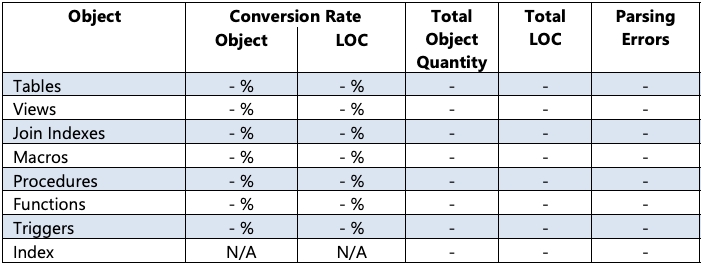Scripts - Identified Objects
This section shows the Script Files conversion summary of Teradata Assessment Report.
This is a deprecated version of the SnowConvert documentation, please visit the official site HERE.
The breakdown of all the database objects created or modified in all script files (BTEQ, BTQ, FL, ML, TPUMP, TPT).

Conversion Rate - Object
Represents the percentage of identified objects by SnowConvert that were successfully migrated. This will help to determine the number of objects that were successfully migrated and the objects that need manual work in order to complete the migration of the objects to Snowflake. If N/A is listed in the column, it means that the object type is not supported in Snowflake. A "-" could also be listed in this column, this means that the set of files migrated by SnowConvert did not contain objects of the specific type that could be identified.
Formula
CSV Associated Field Names
Tables: ScriptTableObjectConversionRate
Views: ScriptViewObjectConversionRate
Join Index: ScriptJoinIndexObjectConversionRate
Macro: ScriptMacroObjectConversionRate
Procedures: ScriptProcedureObjectConversionRate
Functions: ScriptFunctionObjectConversionRate
Triggers: ScriptTriggerObjectConversionRate
Indexes: N/A
Sample
Expected Object Conversion Rate: 50%
Explanation: With the previous sample code we will have a 50% Object Conversion Rate because only 1 of the 2 identified tables were successfully migrated to Snowflake.
Conversion Rate - Lines of Code (LOC)
Indicates the Lines of Code conversion percentage per file extension.
Formula
Associated CSV Field names
Tables: ScriptTableLoCConversionRate
Views: ScriptViewLocConversionRate
Join Index: ScriptJoinIndexLoCConversionRate
Macros: ScriptMacroLoCConversionRate
Procedures: ScriptProcedureLoCConversionRate
Functions: ScriptFunctionLoCConversionRate
Triggers: ScriptTriggerLoCConversionRate
Indexes: N/A
Sample
Expected LOC Conversion Rate: 83.33%
Explanation: With the previous sample code we will have a 83.33% LOC Conversion Rate because line 5 of the input code (Associate_Id ANYTYPE!) could not be migrated and only 5 of the 6 total lines of code were migrated successfully.
Total Object Quantity
Represents the total amount of objects identified by SnowConvert during the parsing phase.
CSV Associated Field Names
Tables: ScriptTableTotalOccurrences
Views: ScriptViewTotalOccurrences
Join Index: ScriptJoinIndexTotalOccurrences
Macros: ScriptMacroTotalOccurrences
Procedures: ScriptProcedureTotalOccurrences
Functions: ScriptFunctionTotalOccurrences
Triggers: ScriptTriggerTotalOccurrences
Indexes: ScriptIndexTotalOccurrences
Sample
Expected Total Object Quantity: 1.
Explanation: One table was completely parsed by SnowConvert during the parsing phase but the other table has a parsing error that causes SnowConvert to not identify it as a table object.
Lines of Code
Represents the total amount of lines code used for the identified top-level objects. It is important to take into account that the lines of code of the top-level object as well as the comments are used for this column. On the other hand, empty lines will not be counted in this column.
CSV Associated Field Names
Tables: ScriptTableTotalLinesOfCode
Views: ScriptViewTotalLinesOfCode
Join Index: ScriptJoinIndexTotalLinesOfCode
Macros: ScriptMacroTotalLinesOfCode
Procedures: ScriptProcedureTotalLinesOfCode
Functions: ScriptFunctionTotalLinesOfCode
Triggers: ScriptTriggerTotalLinesOfCode
Indexes: ScriptIndexTotalLinesOfCode
Sample
Expected Lines of Code: 8
Explanation: In this case, we have 6 lines that come from the code used for the CREATE TABLE statements and 2 for comments that are inside of the top-level objects.
Parsing Errors
Represents the number of parsing errors that are inside of the identified objects.
CSV Associated Field Names
Tables: ScriptTableTotalParsingErrors
Views: ScriptViewTotalParsingErrors
Join Index: ScriptJoinIndexTotalParsingErrors
Macros: ScriptMacroTotalLinesOfCode
Procedures: ScriptProcedureTotalParsingErrors
Functions: ScriptFunctionTotalParsingErrors
Triggers: ScriptTriggerTotalParsingErrors
Indexes: ScriptIndexTotalParsingErrors
Sample
Expected Parsing Errors: 1
Explanation: Only one parsing error will be reported in the Parsing Errors column because SnowConvert was able to only identify the first table. Since the second table was not identified, those parsing errors will not be counted in the Parsing Errors column.
Last updated
